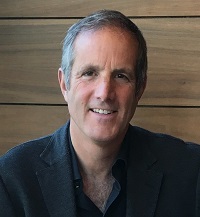Greetings from CPIP Executive Director Sean O’Connor
As we move through our busy fall season here at CPIP, we are grateful for the efforts of everyone in the George Mason University community keeping us safe and healthy. We are fortunate that in these highly uncertain times, we are still able to focus on what we do best: bringing you the research, impact policy pieces, and programming that you have come to expect.
In the copyright sphere, we were gratified by the success of our postponed—and ultimately virtual—conference, The Evolving Music Ecosystem. Highlighted by an informative and moving fireside chat between singer, songwriter, and author Rosanne Cash and CPIP’s Sandra Aistars, the conference also featured seven panels of academics, industry specialists, and artists who provided invaluable insight into copyright law and the music business, especially in light of 2020’s challenges to the industry. Thank you to all who participated and attended! Videos of the keynote address and panel presentations can be watched here.
CPIP also congratulates Shira Perlmutter on her appointment to Register of Copyrights and Director of the U.S. Copyright Office by Librarian of Congress Carla Hayden. We very much look forward to Ms. Perlmutter’s continued positive impact on the copyright community in her new role.
In the patent sphere, CPIP Senior Fellow for Innovation Policy Jonathan Barnett led our roundtable, Measuring the Value of Patent Licensing. Leading legal scholars, economists, and industry representatives focused on the data collection and methodological approaches to quantifying the full economic benefits of commercializing new innovation through patent licensing models.
Congratulations to CPIP Senior Scholar Erika Lietzan on becoming the William H. Pittman Professor of Law & Timothy J. Heinsz Professor of Law at University of Missouri School of Law and for being named a “Best Lawyer in America” for 2020! We are proud of the many accomplishments of our Scholars!
In the coming month, we are excited to host our Eighth Annual Fall Conference on October 7-8. We are partnering with the National Security Institute (NSI) at Scalia Law School to focus on 5G at the Nexus of IP, Antitrust, and Technology Leadership. We hope you’ll be able to join us! You can see the conference program, confirmed speakers, and register for the virtual event here.
Last, but certainly not least, we are proud of the academic and policy publications of our Scholars, Fellows, and other affiliates. Keep reading to learn about work by Sandra Aistars, Jonathan Barnett, Stuart N. Brotman, Ross E. Davies, H. Tomás Gómez-Arostegui, Devlin Hartline, Chris Holman, Erika Lietzan, and Kristen Osenga.
CPIP Eighth Annual Fall Conference with USPTO Director Andrei Iancu on October 7-8

CPIP’s Eighth Annual Fall Conference will be hosted virtually from George Mason University Antonin Scalia Law School in Arlington, Virginia, on October 7-8, 2020. The theme this year is 5G at the Nexus of IP, Antitrust, and Technology Leadership. The conference is being co-hosted by the National Security Institute (NSI), and it features a keynote address by USPTO Director Andrei Iancu.
This conference addresses fast-emerging intellectual property (IP), antitrust, and technology leadership issues in the 5G and “Internet of Things” innovation ecosystem. Coverage includes standard-essential patents (SEPs) along with established and emerging markets on a regional and global basis. Speakers are drawn from the academic, industry, and policymaking communities, with an emphasis on using objective fact-based analysis to explore points of convergence among legal, economic, and geopolitical perspectives on the IP and regulatory infrastructures that underlie these critical industries.
Registration closes on Monday, October 5, 2020, at Noon ET, so please register soon! We have 4 hours of Virginia CLE credit pending!
To visit our conference website and to register, please click here.
CPIP Hosts Academic Roundtable on Patent Licensing Valuation

On September 17, 2020, CPIP hosted an academic roundtable entitled Measuring the Value of Patent Licensing online from George Mason University Antonin Scalia Law School in Arlington, Virginia. The roundtable, which was moderated by CPIP Senior Fellow for Innovation Policy Jonathan Barnett, included leading scholars, economists, and industry representatives.
The sessions focused on the existing methodologies developed to measure IP transactions, the insights achieved so far using those methodologies, and the possibilities for developing more precise methodologies to measure licensing and related transactional activities in the IP marketplace. They also examined the mechanics of IP licensing and transactional markets, how IP transactions generate social value, and the extent to which existing IP legal regimes may impede IP markets.
The Evolving Music Ecosystem Conference with Rosanne Cash

On September 9-11, 2020, CPIP hosted The Evolving Music Ecosystem conference online from George Mason University Antonin Scalia Law School in Arlington, Virginia. The conference featured a keynote address by singer, songwriter, and author Rosanne Cash, and coverage included news articles at Billboard and Mason News. CPIP Senior Scholars Sandra Aistars, Sean O’Connor, and Mark Schultz also participated in the event. We’ve posted a synopsis of each day of the conference here, here, and here.
This unique conference continued a dialogue on the music ecosystem begun by CPIP Executive Director Sean O’Connor while at the University of Washington School of Law in Seattle. In its inaugural year in the D.C. area, the conference aimed to bring together musicians, music fans, lawyers, artist advocates, business leaders, government policymakers, and anyone interested in supporting thriving music ecosystems in the U.S. and beyond.
To visit our conference website and to watch the videos, please click here.
Spotlight on Scholarship

Tomás Gómez-Arostegui & Sean Bottomley, The Traditional Burdens for Final Injunctions in Patent Cases C.1789 and Some Modern Implications, 71 Case W. Res. L. Rev. ___ (forthcoming 2020)
CPIP Edison Fellow Tomás Gómez-Arostegui of Lewis & Clark Law School and co-author Sean Bottomley have published a draft of their law review article that will be published in the Case Western Reserve Law Review. The article takes an historical look at the first two permanent injunction factors from eBay v. MercExchange, namely, irreparable injury and inadequate legal remedies. The article concludes that equitable principles dictate that the Federal Circuit should recognize that: “(1) an injury it seeks to redress with a final injunction is future infringement itself, not just follow-on harms caused by future infringement; (2) it can presume future infringement from past infringement; (3) it can presume that legal remedies are inadequate to remedy future infringement; and (4) it need not require a plaintiff to show that alternative equitable remedies, like ongoing royalties, would inadequately redress future infringement.”
To read the article, please click here.
Stuart N. Brotman, Intersecting Points in Parallel Lines: Toward Better Harmonization of Copyright Law and Communications Law Through Statutory and Institutional Balance, 26 Rich. J.L. & Tech., no. 3, 1 (2020)
The Richmond Journal of Law and Technology (JOLT) has just published a new article by Professor Stuart Brotman, the inaugural Howard Distinguished Endowed Professor of Media Management and Law and Beaman Professor of Journalism and Electronic Media at the University of Tennessee, Knoxville. The article was supported by a Leonardo da Vinci Fellowship Research Grant from CPIP and the research assistance of recent Scalia Law graduate Samantha Levin. The article traverses the history and development of copyright and communications law, which have historically followed separate paths, and offers potential ways that they can be harmonized to match the current realities of the media marketplace.
To read the article, please click here.
Activities, News, & Events

CPIP Director of Copyright Research and Policy Sandra Aistars has written an article at Law360 (also available on the CPIP blog) about Justice Ginsburg’s copyright legacy, especially as it will affect the impending Google v. Oracle decision. Prof. Aistars has also published her latest Copyright Notebook series post, The Importance of Artists’ Agency, on the CPIP blog. Additionally, the Arts & Entertainment Law Clinic—directed by Prof. Aistars—has continued its academic partnership with the U.S. Copyright Office for the fifth year. This semester, they are supporting the Office’s public meetings to investigate standard technical measures (STMs) that could be adopted to aid and identify copyrighted works and to potentially reduce infringement on digital platforms as envisioned in Section 512(i) of the DMCA. Prof. Aistars and the Clinic students will also co-host an online copyright clinic with WALA and the Copyright Alliance that will feature a live performance by the Rock Creek Kings.
CPIP has published a new policy brief by Professor Ross E. Davies entitled Ebb and Flow in Safe Harbors: Some Exemplary Experiences Under One Old Statute and One New. Prof. Davies teaches administrative law, civil procedure, comparative criminal law, contracts, employment discrimination, legal history, legal profession, and torts at George Mason University Antonin Scalia Law School in Arlington, Virginia, and the policy brief is the product of our two Safe Harbors and Private Ordering in the Creative Industries research symposia that were held in 2019. In the policy brief, Prof. Davies compares and contrasts two seemingly unrelated statutory provisions that are often referred to as “safe harbors”—despite that term not appearing in either statute: the National Labor Relations Act (NLRA) as codified in Title 29, and the Online Copyright Infringement Liability Limitation Act (OCILLA)—otherwise known as Title II of the Digital Millennium Copyright Act (DMCA)—as codified in Title 17.
CPIP Scholars have participated in several speaking engagements this past month. CPIP Senior Fellow of Innovation Policy Jonathan Barnett spoke at the Innovation Alliance’s Recognizing the Growing Economic Impact of Patent Licensing webinar. CPIP Senior Fellow for Life Sciences Chris Holman participated in the Regnier Institute for Entrepreneurship and Innovation Kansas City Region’s Bio-Medical and Healthcare Technology Entrepreneurship Certificate Program. CPIP Senior Scholar Erika Lietzan spoke at IPWatchdog’s The Race for a Coronavirus Vaccine: The Intersection of Science and IP Policy webinar. CPIP Senior Scholar Kristen Osenga presented a draft paper at the Gray Center’s Public Health: Regulation, Innovation, and Preparation research roundtable. And CPIP Director of Communications Devlin Hartline participated in the Music Biz Entertainment & Technology Law Conference.
CPIP Scholars have also written op-eds defending the importance of robust patent protection, particularly for biopharmaceutical inventions in light of the COVID-19 pandemic. At the Huntsville Item, CPIP Senior Fellow for Life Sciences Chris Holman argues that the seizure of patents will only hamper the development of a vaccine to combat the coronavirus: “Eliminating intellectual property protections would not only reduce incentives to develop coronavirus treatments as quickly as possible; they will also destroy the domestic industrial base that could be the key to stopping the next pandemic.” Likewise, CPIP Senior Scholar Kristen Osenga argues at the Nashua Telegraph that taxpayers are getting a great deal with biomedical research: “When new treatments are successful, drug companies make money because we, through insurance, buy those drugs to keep us, or make us, healthy. The government then taxes those profits and invests some of that tax money into new research. Far from ‘paying twice,’ we are getting a great bargain from government spending on basic research.”